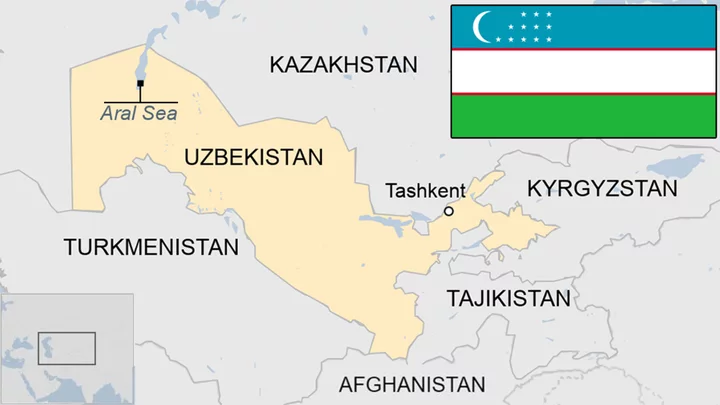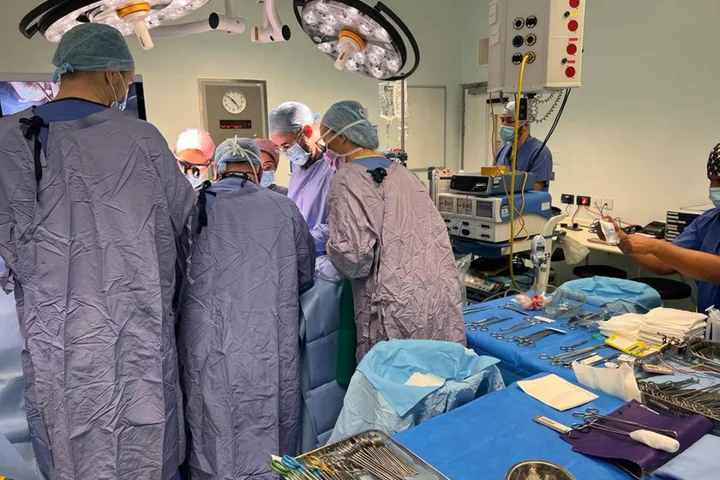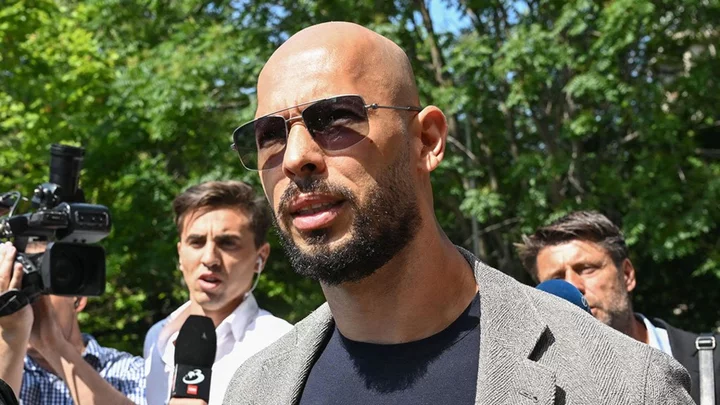
How Sadio Mane stopped Jeremy Doku joining Liverpool
Manchester City-bound Jeremy Doku has revealed how a conversation with Sadio Mane led to a potential transfer to Liverpool falling through.
2023-08-23 17:51

Greek fires rage after migrant tragedy near border
The bodies of 18 males were found in a forest in northern Greece where fires have burned for days.
2023-08-23 17:47

'You can't take it off': Charlize Theron will no longer gain weight for movie roles
Charlize Theron will no longer undergo physical transformations for film roles after piling on the pounds for parts in 'Monster' and 'Tully'.
2023-08-23 17:29

Steven Gerrard dismisses rumours of Al Ettifaq bid for Mason Greenwood
Steven Gerrard has dismissed rumours Al Ettifaq could sign Mason Greenwood from Man Utd.
2023-08-23 17:16

Tonga media guide
An overview of the media in Tonga, including links to broadcasters and newspapers.
2023-08-23 16:59

Tonga country profile
Provides an overview of Tonga, including key dates and facts about this Pacific island nation.
2023-08-23 16:49

Uzbekistan country profile
Provides an overview of Uzbekistan, including key events and facts about this central Asian country.
2023-08-23 16:29

Fukushima disaster: What happened at the nuclear plant?
A tsunami struck the Japanese plant in 2011, leading to the worst nuclear disaster since Chernobyl.
2023-08-23 16:27

Everything you need to know about the UK’s first womb transplant
The UK’s first womb transplant means that, in future, dozens of women born without a functioning organ can carry babies of their own. – What has happened? Surgeons have performed the UK’s first womb transplant on a 34-year-old woman whose older sister donated the organ to her. In a complex procedure, the medical team removed the womb from the 40-year-old woman and implanted it directly into her sister. Both women have made a good recovery. – Have any babies been born? Not yet. Experts want to be sure the transplant is stable and the womb is functioning fully before the younger woman undergoes IVF. She has stored eight embryos and will have fertility treatment later this year in central London. The woman hopes to have more than one baby. Once she has completed her family, the womb will be removed to prevent her needing immunosuppressant drugs for the rest of her life. – Has the NHS paid for the operation? No. Each womb transplant costs around £25,000 and is fully funded by the charity Womb Transplant UK. This includes payment to the NHS for theatre time and the patient’s stay on a ward. The operations are only carried out at times when the NHS is not using the operating theatre, so they do not impact on usual NHS waiting lists. Surgeons and medical staff involved in the transplant have not been paid for the operation and have given their time freely. – Have other womb transplants been carried out around the world? More than 90 womb transplants have been carried out internationally, with most operations involving a living donor. The first successful womb transplant took place in Sweden in 2014, with the baby – Vincent – born to a 36-year-old woman who described him as “perfect”. In 2000, a transplant was performed on a 26-year-old woman in Saudi Arabia but the donor womb survived for only 99 days due to problems with its blood supply. To date, womb transplants have been carried out in more than 10 countries, including Saudi Arabia, Turkey, Sweden, the US, China, Czech Republic, Brazil, Germany, Serbia and India. – How successful is the operation? Data from the US shows that more than half of women who received a womb through a transplant in the US went on to have successful pregnancies. Between 2016 and 2021, 33 women received womb transplants in the US and, as of last summer, 19 of them (58%) had delivered a total of 21 babies. In 74% of those receiving a womb, the organ was still functioning one year after transplant and 83% of this group had live-born children. – Will there be more transplants in the UK? Yes. The second British womb transplant is scheduled to take place this autumn and experts believe a maximum of 20 to 30 per year could be carried out in the UK in the future. Transplants could help women born without a functioning womb and those who lose their organ to cancer or other conditions. Estimates suggest there are 15,000 women in the UK of childbearing age who do not have a functioning womb. – Will there be a shortage of donor wombs? Womb Transplant UK is running two programmes, one involving living donors and another with organs from people who have died. The living donor programme in the UK has so far focused on women with relatives who are willing to give their wombs. However, the team believes that in the future, the living donor programme will expand to include friends or altruistic living donors. This is currently more common in the US. The use of deceased donors is assessed by the team on a case-by-case basis. Read More Charity boss speaks out over ‘traumatic’ encounter with royal aide Ukraine war’s heaviest fight rages in east - follow live Why are wellbeing experts concerned about the ‘lazy girl job’ trend? How to check for cancer, as Morrisons puts NHS cancer advice in underwear labels Prostate screening ‘could save lives’ – the symptoms and risk factors you need to know
2023-08-23 15:52

Andrew Tate prosecution files reveal graphic claims of coercion ahead of trial
Romanian prosecutors' files, seen by BBC, allegedly show the influencer coercing women into sex acts.
2023-08-23 13:17

How South Africa's oldest Quran was saved by Cape Town Muslims
Written by a political prisoner, it is now kept in a bullet-proof casing in a Cape Town mosque.
2023-08-23 10:46

Zimbabwe election: Voters head to the polls with inflation on their minds
Robert Mugabe's successor faces his main challenge from Nelson Chamisa of the opposition CCC.
2023-08-23 10:45
